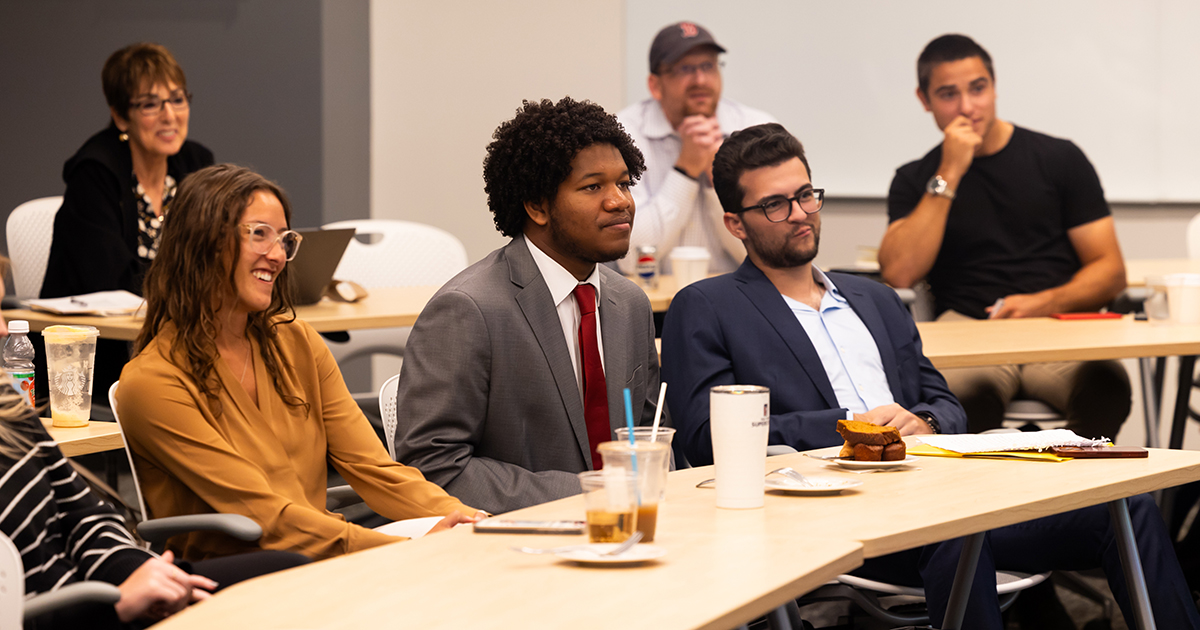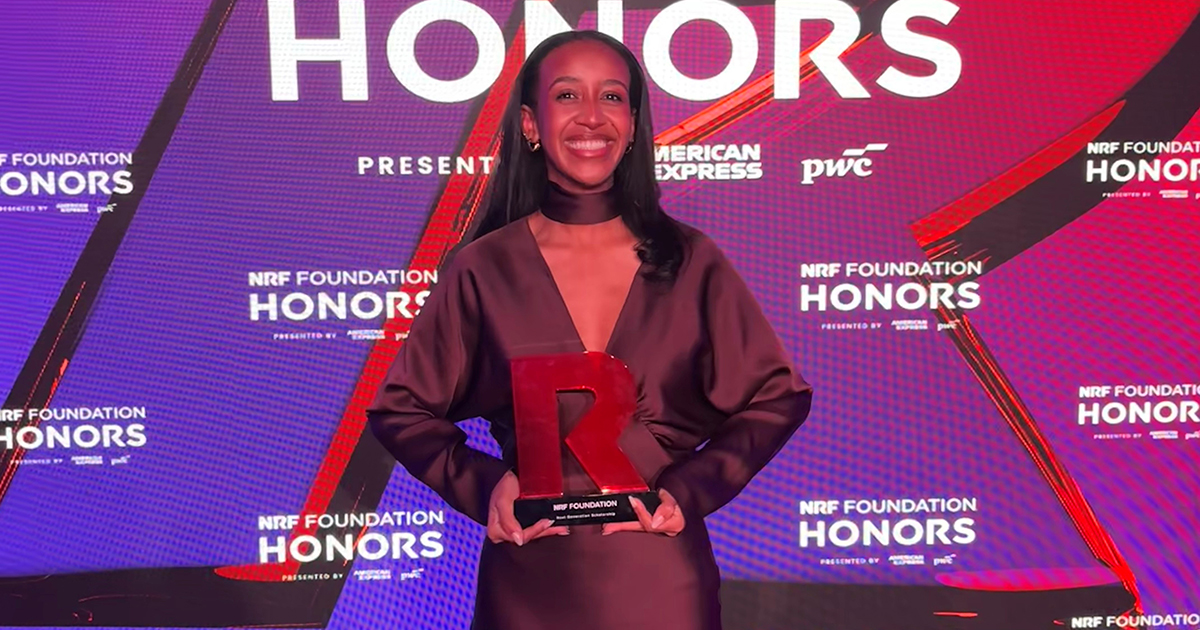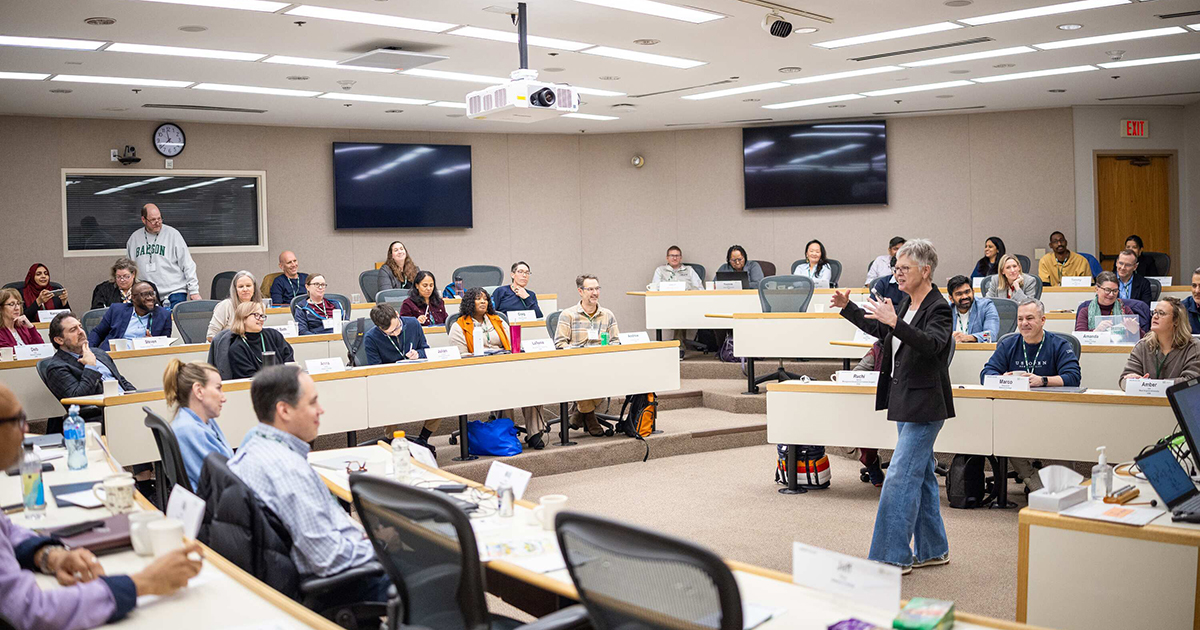Groundbreaking Babson Research Advances the Field of Entrepreneurial Leadership

Decades-old problems persist. Think climate change and health care.
New challenges emerge faster than ever in an ever-evolving technological world. Consider generative AI and privacy rights.
And yet solutions are harder and harder for leaders to find and implement.
The real problem may be the entrenched models of leadership that are failing.
New research from Babson College proposes entrepreneurial leadership as a game-changing solution that could have a long-term impact for businesses and organizations of all kinds. The groundbreaking research offers the first academic model of entrepreneurial leadership.
“Ultimately, entrepreneurial leadership encourages proactive, innovative, and risk-taking behavior, making it essential for both startups and established organizations aiming to adapt and thrive in a rapidly changing world.”
Babson Professor Scott Taylor
“Our proposed conceptual model argues that entrepreneurial leadership is a relational process, not just a set of leader traits,” says Scott Taylor, Babson professor of organizational behavior and the lead author of the new research paper that emphasizes the need for leaders and others to work together to identify opportunities, share ideas, and take action in uncertain environments.
“Ultimately, entrepreneurial leadership encourages proactive, innovative, and risk-taking behavior, making it essential for both startups and established organizations aiming to adapt and thrive in a rapidly changing world.”
A Unique Model of Leadership
Traditional models of leadership often depict a singular hero setting the course and pointing the direction forward. Those models, though, break down when it comes to identifying and solving long-standing problems in the world, in part because they fail to account for leaders’ relationships with their followers.

Entrepreneurial leadership bridges the gap, emphasizing the importance and value of relationships to build collaborative action to pursue entrepreneurial opportunities collectively with followers, according to the Babson research.
The research paper—“A Conceptual Model of Entrepreneurial Leadership: How Entrepreneurial Leaders Enable Entrepreneurial Opportunity”—was published recently in the International Entrepreneurship and Management Journal. The research was led by Taylor, also the inaugural Arthur M. Blank Endowed Chair for Values-Based Leadership at the Arthur M. Blank School for Entrepreneurial Leadership, along with five Babson faculty members:
- Andrew Corbett, the Paul T. Babson Distinguished Professor of Entrepreneurial Studies, faculty director for the Butler Institute for Free Enterprise Through Entrepreneurship, and former chair of the Entrepreneurship Division
- Danna Greenberg, the Walter H. Carpenter Professor of Organizational Behavior, associate dean of faculty, and chair of the Management Division
- Wendy Murphy, professor of management and the associate dean of undergraduate academic programs
- Keith Rollag, professor of management, former dean of the Franklin W. Olin Graduate School of Business, and former chair of the Management Division
- Jeffrey Shay ’87, MBA’91, professor in the Entrepreneurship Division and chair of the board for the Global Entrepreneurship Research Organization (governance board for the Global Entrepreneurship Monitor)
“Until now, entrepreneurial leadership has not been adequately defined or differentiated from traditional leadership theories,” Taylor said. “Given that some of the world’s most successful and celebrated leaders are entrepreneurs, my co-authors and I—also entrepreneurs at heart—have devoted years to conducting research to create a distinct model for this unique type of leadership.”
Their research not only redefines entrepreneurial leadership, with an emphasis on the importance of relationships, but also explains how entrepreneurial leaders can more effectively lead people, companies, and organizations to solve problems and create value.
This work builds on Babson’s long-standing expertise as the No. 1 school for entrepreneurship for three decades. In much the same way that the College revolutionized entrepreneurial education as a discipline that could be learned and developed, Babson is advancing the field of entrepreneurial leadership.
Defining Entrepreneurial Leadership
Although numerous definitions of entrepreneurial leadership have been proposed over the past two decades, scholars and practitioners have not agreed and converged on a unified understanding of entrepreneurial leadership.
Previous definitions have been primarily rooted in either leadership or entrepreneurial domains without adequately exploring their necessary integration. Those definitions also fail to account for the needs of the followers and the important relationship between leaders and followers.
DIG DEEPER ON ENTREPRENEURIAL LEADERSHIP:
- Read Why Entrepreneurial Leadership Matters in Babson Magazine (Summer 2022)
- Find out How to Be an Entrepreneurial Leader in Eight Steps on Babson Thought & Action
- Learn more about Entrepreneurial Leadership at Babson College
In their research, Taylor and his Babson colleagues define an entrepreneurial leader as someone who demonstrates emotional and social competence, as well as an entrepreneurial mindset, to cultivate followers’ satisfaction and enable their intrinsic motivation to act entrepreneurially.
“We propose entrepreneurial leadership as a concept that blends leadership and entrepreneurship to enable leaders and their teams to recognize and pursue innovative opportunities,” Taylor said. “Unlike traditional leadership styles, entrepreneurial leadership is focused on fostering collaboration, innovation, and shared responsibility between leaders and followers.”
The Importance of Relationships
Most notably, the Babson research offers the first conceptual model of entrepreneurial leadership to explain the motivational dynamics that enable collaborative action between leaders and followers to identify and pursue entrepreneurial opportunity.
“The unique skills of entrepreneurial leaders allow them to build meaningful relationships with their followers, inspire creativity, and support risk-taking behaviors,” Taylor said. “Unlike traditional leadership approaches, which often emphasize hierarchy and structure, entrepreneurial leaders focus on flexibility, adaptability, and encouraging entrepreneurial thought and action.”
Taylor and his colleagues’ research draws on self-determination theory in their model, emphasizing the need of leaders to satisfy three innate human needs—autonomy, relatedness, and competence—to intrinsically motivate followers to act entrepreneurially.
“The unique skills of entrepreneurial leaders allow them to build meaningful relationships with their followers, inspire creativity, and support risk-taking behaviors.”
Babson Professor Scott Taylor
“Emotional, cognitive, and hormonal functions play an essential role in unleashing human potential in others,” Taylor said.
But it’s not easy. The Babson research finds that positive emotions and empathetic brain networks enhance creativity and openness, but negative emotions and stress-related responses inhibit these capabilities. Effective entrepreneurial leaders demonstrate a high level of cognitive flexibility to maximize their collaborations and the teams around them.
“The leader-follower dynamic is central to entrepreneurial leadership,” Taylor said, “with the leader’s mindset and emotional intelligence playing a critical role in fostering a culture of innovation and collaboration.”
That culture of innovation and collaboration is key to effective entrepreneurial leadership. It’s a unique model of leadership that has wide-ranging implications for the future of solving the world’s greatest challenges.
Posted in Entrepreneurial Leadership




